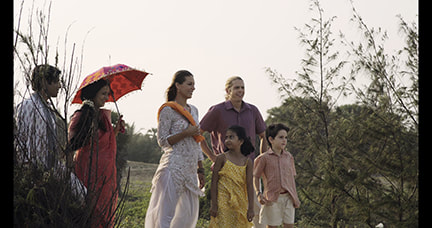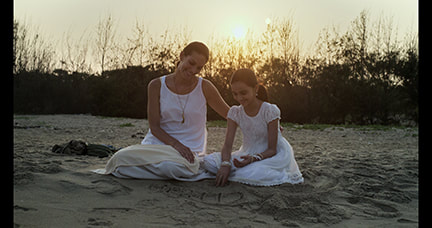By Sonam Mirpuri
Loving and appreciating the art of storytelling is one of the reasons Kaarthikeyan Kirubhakaran, 53, began his adventurous journey in the entertainment industry about 30 years ago. He truly believed and continues to believe that the right stories could shape lives...
Loving and appreciating the art of storytelling is one of the reasons Kaarthikeyan Kirubhakaran, 53, began his adventurous journey in the entertainment industry about 30 years ago. He truly believed and continues to believe that the right stories could shape lives...
for the better. Kirubhakaran’s most recent film, ‘His Father’s Voice,’ brings to light the child’s perspective when their parents fight and ultimately decide to split.The main cast includes Christopher Gurusamy, Jeremy Roske, Julia Koch, Sudharma Vaithiyanathan, P T Narendran, and Ashwini Pratap Pawar. Kirubhakaran wore many hits -writer, producer, cinematographer and director in order to bring this movie to life.
Excepts from an exclusive interview with IJ:
Q .What inspired the story?
A. The plight of children torn between parents who can no longer get along. Families breaking up for a lack of love and understanding, and the heavy emotional price that children are forced to pay, for no fault of theirs.
Q. How did you write the scripts?
A. A lot of it was written on my phone. It grew slowly, around the central core of a father’s longing to be with his son. The scenes came together, at the oddest moments, in the midst of other activities. I knew that the inspiration would pass if I did not surrender and write at that moment. It is like the call of a child that you cannot ignore. You have to put aside all else.
Q.Why the title His Father’s Voice?
A.Perhaps because, I am a father and the film itself is an expression of my love, for my children.
Q. How long has the His Father’s Voice process taken?
A. The screenplay of the film, was written over a period of six months. It began with my first experience of loss, of a loved one, at the age of fourteen.
Q. What obstacles did you face?
A. The first requirement is to be able to pitch the story well. Usually, these are extremely busy people with short attention spans. I found it incredibly difficult to pitch my story to them, in just a few words. I would find myself talking a little too much about the ambiance and the setting, than about the story itself. That didn’t help.
Q. Was it difficult to find funding for this film?
A. Yes, it was, as the film is a family drama, and an original screenplay, outside the mainstream.
Q. After being part of multiple aspects of film making, which aspect do you enjoy most? Why?
A. I enjoy writing the most. It is here that you are free to dream and write the impossible. You risk only your own ego. In every other aspect of film making, the cost of failure is terribly high, not just to yourself, but also to everyone else, who has a financial stake in the project. It is a huge responsibility.
Q. Which aspect of film making was the most challenging? Why?
A. The most challenging aspect of film making is convincing people that they can actually do better. Sometimes, people with less experience can give more to a project than those who are terribly sure of themselves. In such a case, how do you make them even better? That is the challenge.
Q.What was the significance of Ramayana in the backdrop of the story?
A. Ramayana is an epic that deals in significant measure, with this issue of separation from a loved one. The stories from this epic are often adapted for Indian Classical Dance. The dance drama, derived from the story of Rama’s separation from his sons, becomes an interesting backdrop as the son, grapples with his own emotions, towards his father.
Q. Knowing what you know now, if you could go back in time, would you have made any different decisions?
A .Fortunately, I have no regrets. I’m aware that I may make different decisions in the future, under similar circumstances. I try to do my best and that is all that matters.
Q. What advice would you give individuals today who are trying to make it in this industry?
A .Please don’t try to make it. It is better to fail and find your own voice in the process than to succeed as a parrot!
Q .How do you feel about the representation of South Asians in the media?
A. It is important to be aware of the bias, in any representation. All we can do is to strive for authenticity, in what we choose to represent.
Q.What are your goals in the industry and in life?
A. To make films that contribute to making this world a better place. To live every moment, as though it were my last!
Q. What are your upcoming projects?
A. My next film will focus on the power of habit to shape our life, and how the only true revolution, is the one we live, inside of ourselves.
‘His Father’s Voice’ is now available on Amazon Prime in the U.S., Canada, and Australia.
Excepts from an exclusive interview with IJ:
Q .What inspired the story?
A. The plight of children torn between parents who can no longer get along. Families breaking up for a lack of love and understanding, and the heavy emotional price that children are forced to pay, for no fault of theirs.
Q. How did you write the scripts?
A. A lot of it was written on my phone. It grew slowly, around the central core of a father’s longing to be with his son. The scenes came together, at the oddest moments, in the midst of other activities. I knew that the inspiration would pass if I did not surrender and write at that moment. It is like the call of a child that you cannot ignore. You have to put aside all else.
Q.Why the title His Father’s Voice?
A.Perhaps because, I am a father and the film itself is an expression of my love, for my children.
Q. How long has the His Father’s Voice process taken?
A. The screenplay of the film, was written over a period of six months. It began with my first experience of loss, of a loved one, at the age of fourteen.
Q. What obstacles did you face?
A. The first requirement is to be able to pitch the story well. Usually, these are extremely busy people with short attention spans. I found it incredibly difficult to pitch my story to them, in just a few words. I would find myself talking a little too much about the ambiance and the setting, than about the story itself. That didn’t help.
Q. Was it difficult to find funding for this film?
A. Yes, it was, as the film is a family drama, and an original screenplay, outside the mainstream.
Q. After being part of multiple aspects of film making, which aspect do you enjoy most? Why?
A. I enjoy writing the most. It is here that you are free to dream and write the impossible. You risk only your own ego. In every other aspect of film making, the cost of failure is terribly high, not just to yourself, but also to everyone else, who has a financial stake in the project. It is a huge responsibility.
Q. Which aspect of film making was the most challenging? Why?
A. The most challenging aspect of film making is convincing people that they can actually do better. Sometimes, people with less experience can give more to a project than those who are terribly sure of themselves. In such a case, how do you make them even better? That is the challenge.
Q.What was the significance of Ramayana in the backdrop of the story?
A. Ramayana is an epic that deals in significant measure, with this issue of separation from a loved one. The stories from this epic are often adapted for Indian Classical Dance. The dance drama, derived from the story of Rama’s separation from his sons, becomes an interesting backdrop as the son, grapples with his own emotions, towards his father.
Q. Knowing what you know now, if you could go back in time, would you have made any different decisions?
A .Fortunately, I have no regrets. I’m aware that I may make different decisions in the future, under similar circumstances. I try to do my best and that is all that matters.
Q. What advice would you give individuals today who are trying to make it in this industry?
A .Please don’t try to make it. It is better to fail and find your own voice in the process than to succeed as a parrot!
Q .How do you feel about the representation of South Asians in the media?
A. It is important to be aware of the bias, in any representation. All we can do is to strive for authenticity, in what we choose to represent.
Q.What are your goals in the industry and in life?
A. To make films that contribute to making this world a better place. To live every moment, as though it were my last!
Q. What are your upcoming projects?
A. My next film will focus on the power of habit to shape our life, and how the only true revolution, is the one we live, inside of ourselves.
‘His Father’s Voice’ is now available on Amazon Prime in the U.S., Canada, and Australia.



 RSS Feed
RSS Feed
